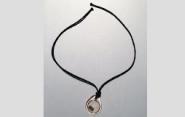Khushi Baby Wins $250K Johnson & Johnson Prize

Khushi Baby, the company behind a potentially life-saving device that originated at the Center for Engineering Innovation & Design (CEID), has won a $250,000 prize from Johnson and Johnson.
 Johnson & Johnson’s GenH Challenge for Maternal and Child Health invited participants to from around the world to submit globally-relevant solutions to undergoing health challenges. In total, they received 1,061 registrations across 74 countries. Khushi Baby, currently based in India, was the grand prize winner.
Johnson & Johnson’s GenH Challenge for Maternal and Child Health invited participants to from around the world to submit globally-relevant solutions to undergoing health challenges. In total, they received 1,061 registrations across 74 countries. Khushi Baby, currently based in India, was the grand prize winner.
The Khushi Baby system includes a necklace with a computer chip inside that stores up to two years of vaccination records for young children. The system uses near field communication (NFC) technology to send and receive information through a smartphone. Data is synced to the cloud and displayed on a dashboard accessible to health officials. Even without a connection to a central database, health workers can scan the chip, see the health information and update it if needed.
The device was developed as part of the course "Appropriate Technology in the Developing World," designed to tackle ongoing global issues, which was co-taught by Dr. Joseph Zinter, assistant director of the CEID, and SEAS Lecturer Bo Hopkins.
Ruchit Nagar, co-founder and CEO of Khushi Baby, said he was “thrilled” about the award and plans to use the money toward several purposes.
“First, we look forward to increasing our footprint on the ground in the district of Udaipur, Rajasthan, where we are already tracking 12,000 beneficiaries across 375 villages with 80 health workers,” he said. “With the GenH funds and support from other donors, we are positioned to turn our current initiative into a true model for districts across the State of Rajasthan and across India to replicate and scale.”
By the end of 2019, he said, the company aims to track the health of at least half the district - approximately 100,000 beneficiaries altogether, and directly integrating the platform into the State Electronic Health Registries for Maternal Child Health and Birth.
He said the company, which is quickly expanding its full-time team, is also interested in developing new technological capabilities. These include a QR code-based vaccine registry, facial biometrics for infants, improved clinical-decision support and tracking of high risk mothers and children.

